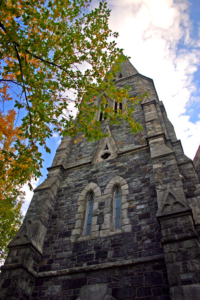Facing Hard Truths About Secular Colleges
Editor’s Note: The article below is included in the forthcoming fall 2021 edition of the Newman Society’s Our Catholic Mission magazine. A version of this piece was published at The Catholic Thing.
An article by R.R. Reno made waves this summer, especially in academic circles, because of his frank rejection of “elite” secular universities.
Reno is editor of First Things magazine, which caters to a generally highbrow readership. He is a graduate of the prestigious Haverford College, earned his Ph.D. at the Ivy League’s Yale University, and taught theology at Creighton University—a Jesuit institution that has national prominence, despite having drifted away from its Catholic mission.
Still, Reno no longer recruits Ivy League graduates for employment.
“I don’t want to hire someone who makes inflammatory accusations at the drop of a hat,” he writes, responding to the increasingly hostile “cancel culture” on Ivy League and other “elite” college campuses. He also doesn’t want to hire graduates who have become “well-practiced in remaining silent when it costs something to speak up” against the prevailing campus ideologies.
“I have no doubt that Ivy League universities attract smart, talented and ambitious kids,” Reno acknowledges. “But do these institutions add value? My answer is increasingly negative. Dysfunctional kids are coddled and encouraged to nurture grievances, while normal kids are attacked and educationally abused.”
Toxic for Catholics
Most Catholic college students attend secular colleges (and largely secularized Catholic colleges) where the anti-reason “cancel culture” threatens anyone who espouses Catholic teaching and even Western culture. Shouldn’t the Church be doing more to warn them of the dangers?
Jennifer Frey, a philosophy professor at the public University of South Carolina, is a faithful Catholic who promotes multidisciplinary dialogue about virtue and goodness among her faculty. But as she explained recently in The Point Magazine, she is confronted by the very definition of secular higher education today. Its focus is deliberately concentrated on scientific knowledge, it rejects philosophical thinking about higher truths, and it excludes the essential truths of theology.
“My own vision of what a university should be is inspired by the Catholic tradition in which it originally came to be: a university is, in its essence, a community of scholars and students who seek the truth together as a common end for its own sake,” writes Frey. She cites St. John Henry Newman and his argument for theology as the foundational discipline of all education, “since God is the only coherent source of the sort of unity and order that such a search presupposes.”

Photo via Adobe Stock
Newman’s vision of a true university “has no chance of being realized outside of a Catholic context,” Frey acknowledges. But she strives for some “alternative vision of a secularized university” that at least recaptures an appreciation of various theologies. It might be the most that can be accomplished in a public university today—but it this the education young Catholics deserve?
Concerns about secular education go well beyond academics, of course. Student life on most secular campuses is toxic to students trying to uphold Christian morality and to simply live healthily. Many students lack sleep and good physical habits, they abuse alcohol and possibly drugs, and they may suffer anxiety as a result of promiscuous lifestyles and shallow relationships. Most secular institutions today aggressively promote gender ideology and sexual immorality, even to the point of demanding students’ assent in contradiction to our Catholic faith.
The Church has made it a priority to provide Catholic centers and Bible studies on secular campuses, offering some opportunity for Christian fellowship and the grace of the sacraments. But these cannot alter the general campus culture, which is increasingly dangerous for young Catholics. Such apostolates also cannot provide an authentically Catholic education, in which the insights of our Catholic faith bring light to every subject and provide a solid foundation for personal formation.
Parents’ right to know
The Catholic Church must not turn a blind eye to the growing dangers of secular education. There is surely nothing “elite” about colleges that embrace depravity and lack commitment to truth and reason. Long ago, they turned against faith-filled, liberal arts education. Many today seem intent on malforming young people.
“We do not flourish without communion with the good,” Frey argues, and that first requires forming students in “virtues like wisdom, courage and justice.” These are best cultivated in the home and within an education that is centered on Christ.
Secular education, with its focus on training students for functional roles in the economy and society, rejects an authentic higher education that forms the whole person. Catholic leaders must recover confidence in Catholic education and proclaim it, especially (but not only) to the faithful who either have lost appreciation for the superiority of a Catholic education or have been let down by colleges that are not truly committed to their Catholic missions. We need to restore trust as well as confidence.
Frey, who argues the essential roles of theology and philosophy to higher education, concedes that the ideal is a Catholic institution. Reno has chosen to hire graduates of “quirky small Catholic colleges such as Thomas Aquinas College, Wyoming Catholic College and the University of Dallas,” which are not “deformed by the toxic political correctness that leaders of elite universities have allowed to become dominant.” These are among the colleges highlighted by The Cardinal Newman Society in our Newman Guide, which offers Catholic families a variety of faithful options for higher education.
These colleges are for the most part growing each year, even as many private colleges across the country are struggling to maintain enrollment. Catholics should be rallying around these faithful colleges and encouraging families to give them strong consideration. Meanwhile, we need to talk openly about the dangers that young Catholics face at secular colleges and steer them to better options.
I recently spoke to a good friend who provided a strong Catholic education to his children but then sent the eldest to his alma mater, a highly reputed public university. He regrets the choice and bemoans the poisonous campus culture.
“I just didn’t know how bad it had become,” the father told me. I think he deserved to know.

